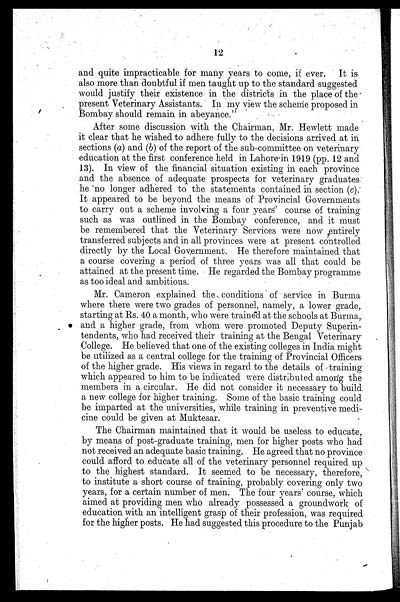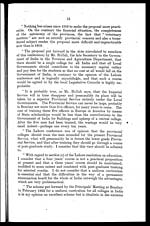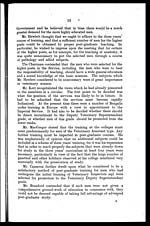Medicine - Veterinary > Civil Veterinary Departments > Proceedings of the meeting of veterinary officers in India > Proceedings of the second meeting of veterinary officers in India
(78) Page 12
Download files
Individual page:
Thumbnail gallery: Grid view | List view

12
and quite impracticable for many years to come, if ever. It is
also more than doubtful if men taught up to the standard suggested
would justify their existence in the districts in the place of the
present Veterinary Assistants. In my view the scheme proposed in
Bombay should remain in abeyance."
After some discussion with the Chairman, Mr. Hewlett made
it clear that he wished to adhere fully to the decisions arrived at in
sections (a) and (6) of the report of the sub-committee on veterinary
education at the first conference held in Lahore in 1919 (pp. 12 and
13). In view of the financial situation existing in each province
and the absence of adequate prospects for veterinary graduates
he no longer adhered to the statements contained in section (c).
It appeared to be beyond the means of Provincial Governments
to carry out a scheme involving a four years' course of training
such as was outlined in the Bombay conference, and it must
be remembered that the Veterinary Services were now entirely
transferred subjects and in all provinces were at present controlled
directly by the Local Government. He therefore maintained that
a course covering a period of three years was all that could be
attained at the present time. He regarded the Bombay programme
as too ideal and ambitious.
Mr. Cameron explained the conditions of service in Burma
where there were two grades of personnel, namely, a lower grade,
starting at Rs. 40 a month, who were trained at the schools at Burma,
and a higher grade, from whom were promoted Deputy Superin-
tendents, who had received their training at the Bengal Veterinary
College. He believed that one of the existing colleges in India might
be utilized as a central college for the training of Provincial Officers
of the higher grade. His views in regard to the details of training
which appeared to him to be indicated were distributed among the
members in a circular. He did not consider it necessary to build
a new college for higher training. Some of the basic training could
be imparted at the universities, while training in preventive medi-
cine could be given at Muktesar.
The Chairman maintained that it would be useless to educate,
by means of post-graduate training, men for higher posts who had
not received an adequate basic training. He agreed that no province
could afford to educate all of the veterinary personnel required up
to the highest standard. It seemed to be necessary, therefore,
to institute a short course of training, probably covering only two
years, for a certain number of men. The four years' course, which
aimed at providing men who already possessed a groundwork of
education with an intelligent grasp of their profession, was required
for the higher posts. He had suggested this procedure to the Punjab
Set display mode to: Large image | Zoom image | Transcription
Images and transcriptions on this page, including medium image downloads, may be used under the Creative Commons Attribution 4.0 International Licence unless otherwise stated. ![]()
| Permanent URL | https://digital.nls.uk/75515186 |
|---|
| Description | Held at Calcutta from the 22nd February to 2nd March 1923. |
|---|---|
| Shelfmark | IP/RA.7 |
| Additional NLS resources: | |




